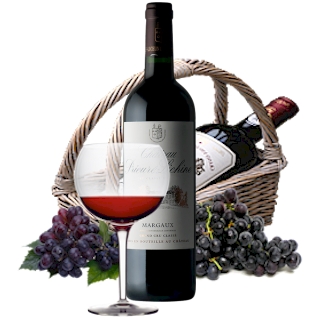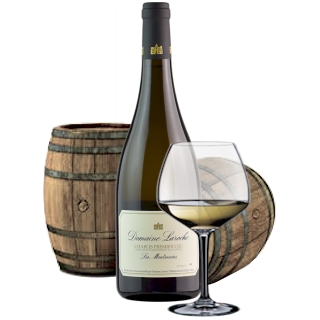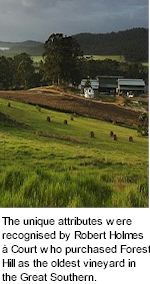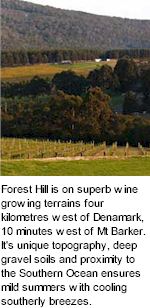


The Forest Hill philosophy is to make individual wines of the highest quality with distinctive regional character. The estate takes aim to produce approachable, understated styles that are pure expressions of unique sites within the forty year old Forest Hill vineyard. Each Forest Hill wine is a true expression of the Great Southern wine growing region of Western Australia, displaying unique regional and varietal character with finesse, elegance and definition.

Established in 1965 Forest Hill is the oldest cool climate vineyard in Western Australia. The combination of warm days, cool nights and mature, dry grown vines contribute to the Forest Hill wines achieving worldwide recognition and winning multiple awards over its forty year history. In 1965 The Department of Agriculture and Dr John Gladstone chose the Pearse family's Forest Hill farm after extensive research to find the most suitable site for the production of premium quality, cool climate wine styles in WA.
The Forest Hill Vineyard is planted 10 minutes drive west of Mt Barker. It's unique topography, deep gravel soils and proximity to the Southern Ocean ensures mild summers with cooling southerly breezes. This provides ideal conditions for the production of cool climate wine styles. The Forest Hill winery is designed to retain regional and varietal character throughout the winemaking process by using small, individual fermentation tanks, sorting tables for hand- picked fruit and state of the art technology.
A Millars timber line originally ran through this Denmark site moving timber from Denmark to Albany, part of which can still be seen below the first row of vines as you enter Forest Hill. Some time after the Millars departure the timberline became the main road west of Denmark and held the name among locals as Musical Bend. Apparently when a breeze moved through the canopy of adjoining trees above the crossing, a musical tone could be heard through the valley, the same valley that now holds the backdrop to the Forest Hill ampitheater.

Two hectares of Cabernet Sauvignon and Riesling were planted and the first of the fruit was processed at Houghton's Winery in the Swan Valley and later at Sandalford. At the time of establishment, vineyard irrigation was not an industry consideration and all early plantings were dry grown providing drought prevention and ensuring low yields. Forest Hill have retained this approach, believing it to be a major contributor to vine health and concentration of fruit flavour.
As the vineyard developed and more vines were planted, Forest Hill began to be recognised throughout Australia as a producer of very high quality fruit and the backbone behind some of WA's most famous wines. The unique attributes of the region were recognised by the late Robert Holmes à Court who, in 1989 purchased Forest Hill as the oldest vineyard in the Great Southern to complement his ownership of Vasse Felix, the oldest vineyard in Margaret River. As time went by and the WA wine industry developed, Forest Hill's Vineyard's reputation grew, but the Forest Hill label remained boutique in nature and was produced in very small quantities.
In 1996 Tim Lyons acquired the Forest Hill Vineyard. Taking advantage of the diversity of the land and the potential for selecting specific planting sites, Lyons slowly expanded the vineyard to include new varieties and new viticultural techniques whilst retaining the focus on low yields, hand pruning and hand harvesting. In 2003, a winery site was established in the nearby coastal town of Denmark and a new viticulture, winemaking and marketing team were brought on board. For the first time in its history fruit from the Forest Hill vineyard was processed in its own winery and sold in the newly built cellar door.
In 2005 Greenpool Restaurant and Function Centre was opened and has since hosted countless weddings, business functions and theme nights. The architecturally designed building and stunning views over the valleys have proven a great draw card for functions, lunches or even just a quiet glass of wine on the balcony.
